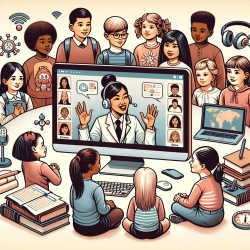Introduction
In the realm of speech-language pathology, the development and well-being of children are profoundly influenced by their access to nutritious food. The research article "Access to nutritious food, socioeconomic individualism and public health ethics in the USA: a common good approach" by Azétsop and Joy offers a compelling framework for understanding and addressing the barriers to healthy food access, which can ultimately impact child development and performance in educational settings.
The Common Good Approach
The concept of the common good, as explored in the research, provides a lens through which practitioners can evaluate and address the systemic issues contributing to food insecurity. This approach emphasizes the importance of societal structures in ensuring that all individuals, particularly children, have access to the resources necessary for optimal development.
For practitioners in speech-language pathology, understanding the common good involves recognizing that food inaccessibility is not merely an individual problem but a structural one. This perspective encourages a shift from blaming individuals for their circumstances to addressing the broader societal factors that limit access to nutritious food.
Implementing Research Outcomes
Practitioners can leverage the insights from this research to advocate for policies and practices that promote equitable access to nutritious food. Here are some actionable steps:
- Advocacy for Policy Change: Engage in advocacy efforts to influence policy changes that address food deserts and promote the availability of healthy food options in underserved communities.
- Community Partnerships: Collaborate with local organizations and schools to create programs that provide nutritious meals to children, particularly in low-income areas.
- Educational Initiatives: Develop educational programs for parents and caregivers about the importance of nutrition in child development and how to access available resources.
Encouraging Further Research
The research highlights the need for continued exploration into the social determinants of health and their impact on child development. Practitioners are encouraged to contribute to this body of knowledge by conducting studies that examine the relationship between nutrition and speech-language outcomes in children.
Conclusion
By adopting a common good approach, speech-language pathologists can play a pivotal role in addressing the systemic barriers to nutritious food access. This not only supports the health and development of children but also fosters a more equitable society. For those interested in delving deeper into the research, the original paper provides a comprehensive analysis of these issues.
To read the original research paper, please follow this link: Access to nutritious food, socioeconomic individualism and public health ethics in the USA: a common good approach.










